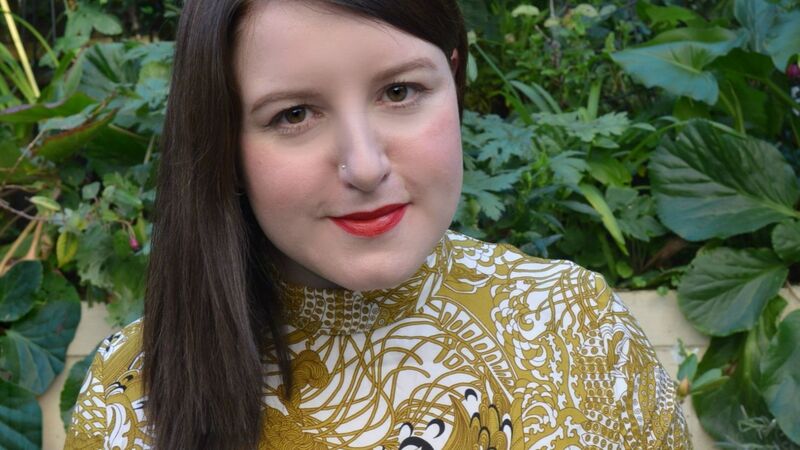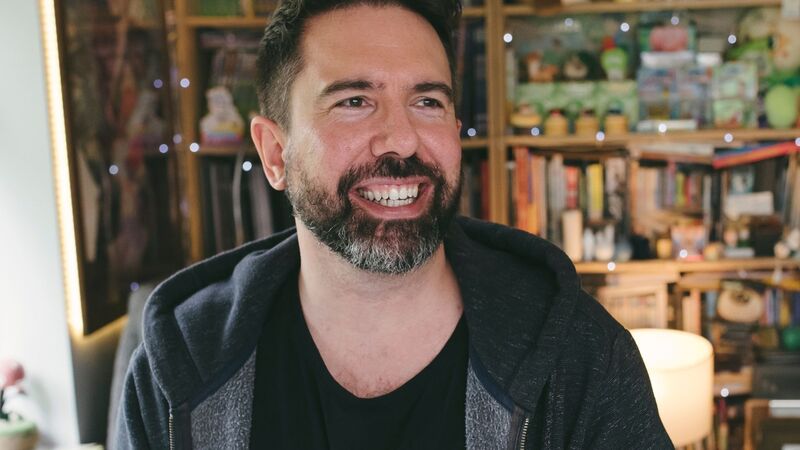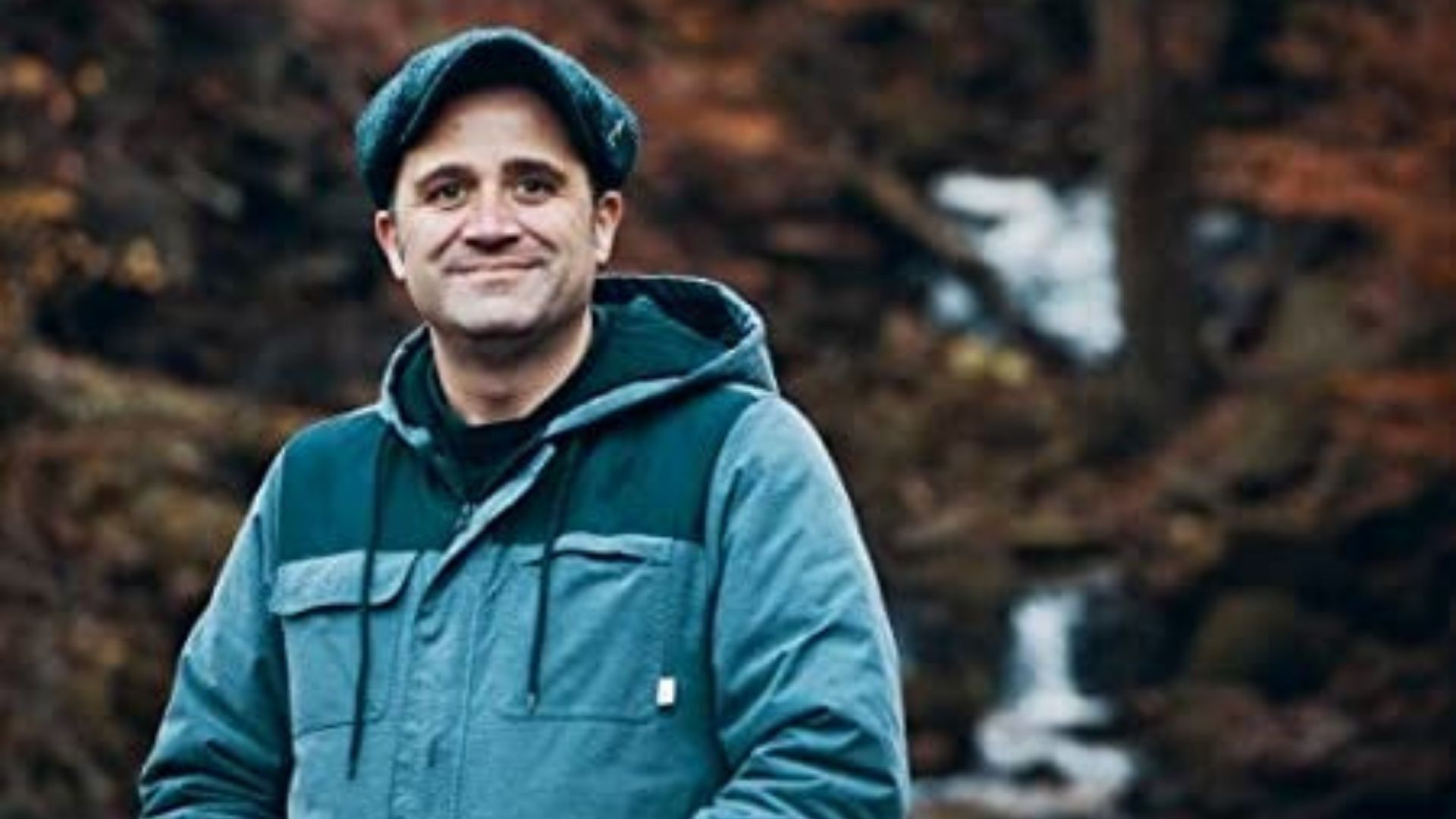You are viewing your 1 free article this month. Login to read more articles.
Tied up
First, the bow tie. David Fickling’s sartorial signature—the one that will make him easy to spot in the crowded Bologna Children’s Book Fair halls next week—is not a recent addition, having been part of the Fickling look for almost 40 years, since he first donned one as a 26-year-old editor at Oxford University Press’ children’s division.
"I got teased unmercifully by my colleagues at the beginning," he laughs. "They dubbed me ‘Young Middle-Class Editor of the Year’. There was a practicality, though—I have the most execrable dress sense and it was something I could put on without having to think about what to wear. It’s useful though, as sort of a toad-stool warning, like saying: ‘Better watch out, here comes a publisher.’"
 But it is a recognisable part of his style, so much so that his publishing company has had fun with it. On the website of David Fickling Books—the Oxford-based entity he founded as a Scholastic imprint in 2000, transferred to Random House in 2001 and took independent five years ago—the link to the firm’s newsletter has a mock Lord Kitchener/Uncle Sam-style "DFB needs you" recruitment poster (illustrated by Dave Shelton) with bow tie prominently displayed.
But it is a recognisable part of his style, so much so that his publishing company has had fun with it. On the website of David Fickling Books—the Oxford-based entity he founded as a Scholastic imprint in 2000, transferred to Random House in 2001 and took independent five years ago—the link to the firm’s newsletter has a mock Lord Kitchener/Uncle Sam-style "DFB needs you" recruitment poster (illustrated by Dave Shelton) with bow tie prominently displayed.
When I suggest the bow tie is good branding, he demurs. "I don’t believe in branding, I believe in hallmarking," he says. "To me, the etymology of a brand is ownership: singeing a mark on a cow. When, say, a goldsmith hallmarks something, they are saying: ‘I made this at this particular time and it is a thing of quality and it works.’ That’s what I think we do with everything we publish."
Belle of the fall
Things have certainly been working at DFB. Full-year 2017 sales rose 36%, with the UK growth margin (+39%) slightly outstripping international (+29%). The quality is there, with DFB titles popping up on every major children’s prize shortlist and longlist in the past year, including Lissa Evans’ Wed Wabbit (Costa, Blue Peter, Carnegie), Pam Smy’s Thornhill (Waterstones Children’s Book Prize, Kate Greenaway), Tony Mitton’s Potter’s Boy (Branford Boase) and Adam and Lisa Murphy’s Corpse Talk: Groundbreaking Scientists (Blue Peter). Not a bad strike rate for a company that produces 25–30 titles a year.
Plus, there was a little book called La Belle Sauvage. Philip Pullman’s long-awaited return to the His Dark Materials universe was unquestionably the publishing event of 2017; and the novel has gone on to earn just over £4m through Nielsen BookScan UK for DFB and its co-publisher, Penguin Random House Children’s. The somewhat unusual arrangement came about because the title was acquired by PRH long before DFB went independent. But, as Fickling has worked with Pullman since buying his second book, The Ruby in the Smoke, for OUP in 1985, the author wanted to stick with his usual editor. Fickling says: “I did get my claws into [Pullman] early. I’m just very lucky to have been associated with him. He describes it as a long conversation between the two of us, but really it’s mostly me just listening to him. Who wouldn’t want to keep working with a storyteller who blows your head off every time? But I should say that I’m hardly the only one working with Philip, I guess I’m the lead editor. An author really needs to hear a number of voices about their work during the writing process. I don’t really believe in the supposed special relationship between an author and editor."
The book had a long gestation period, not just due to the health problems Pullman discussed around the launch of La Belle Sauvage. Fickling says: "I remember having meetings to assuage lovely people like [former Random House c.e.o.] Gail Rebuck. But I was relaxed and patient because I know Philip. Writing a great book is difficult and takes the time it takes. You wouldn’t say, ‘Hurry up and finish that War and Peace, Mr Tolstoy.’" Partnering with PRH was a smooth process. In fact, Fickling notes that working with them as an independent was easier than being an imprint. He says: "Being outside of the company, your editorial suggestions are listened to a bit more and you can better represent the writer in how he wants to be published."
Does he miss some things about being under the wing of a huge conglomerate? "Oh, a bit of me longs to be back at PRH. You are sitting upon a great pile of treasure. As a smaller indie, you inevitably lose out on acquiring some books because you have to be fiscally responsible. But then again I don’t miss having to listen to [corporate] accountants say: ‘Well, you don’t know this book is really going to sell, do you, David?’
"What I love about where DFB is now is that we can be independent in editorial spirit and not have to look at the past trends or what has gone before, but [instead consider] the quality of the work and what’s next down the line. That’s what I think is very hard for the big companies: they can’t help being prisoners of the algorithm."
The long game
This year will be DFB’s first time at Bologna with its own bespoke stand, which perhaps underscores the excellent year it is coming off, but also its punching-above- its-weight global ambitions. Since 2015, DFB titles have entrée into the US market under its first-look joint publishing agreement with Scholastic US. The DFB rights team—headed up by Bronwen Bennie, who was at RH Children’s for more than 20 years—has had a busy time of it recently. One of its biggest successes has been Smy’s Thornhill, with the genre-busting graphic ghost story snapped up in 14 territories and counting.
One area of growth in the immediate future is a branching out into adult titles. DFB made its first inroads into this part of the market with Daemon Voices, a book of Philip Pullman’s essays, released at the end of last year. This year it will publish both the late Mal Peet’s first adult novel, Mr Godley’s Phantom, and Jon Walter’s suffragette-themed Nevertheless, She Persisted.
Both Peet and Walter have been previously published by DFB, and Fickling calls the move a natural progression: "We are kind of saying that our feet are in children’s books and will remain there, but our hands are reaching up to adult. Ideally I would really like to publish books that are not strictly for kids or only for adults, but with wide appeal. We’re not trying to muddle things—we’ll always keep story at our heart."
On the horizon
Fickling whizzes through the DFB’s recent and upcoming highlights with unbridled enthusiasm. A concerted move into children’s non-fiction will be kicked off with First Names, a series of short biographies commissioned by Helen Greathead, who was the lynchpin of the Horrible Histories publishing team at Scholastic. Books about Elon Musk and Emmeline Pankhurst launch the list in April (the title of each book will be the first names of the subjects). Andrew Norriss’ novel Mike, published in January, Fickling says, "will be a worldwide bestseller, it’s light in tone but deep, and adorable." Wed Wabbit creator Lissa Evans is "an extraordinary writer of prose, probably comparable to [Pullman]."
I suggest he has missed out one highlight, his own book, Tiny Little Rocket, a space-set adventure that was released at the beginning of February, illustrated by Richard Collingridge. The book came out of a poem he wrote for an anthology, which his daughter Rosie Fickling (a DFB editor) suggested would work perfectly for a picture book. "It’s really all about [Collingridge] and his amazing art," Fickling says, sounding slightly abashed. "But I am proud of it, I like the idea of publishing things where outer space matters. Although it’s a bit outrageous [that] I published it myself."
Fickling is "65 and I should probably be put aside in a comfy chair soon" but he is certainly thinking about the future. "I want DFB to have a long stride," he says. "Like planting a hedge, you never expect to see it fully grown. My ambitions for DFB are extremely ridiculous. I want it to be known as a place where good texts are made longer than John Murray.”
Matching John Murray’s run as an independent would see DFB lasting to the year 2247, which would be a good innings, to say the least. The key to a publishing house having that sort of longevity, Fickling says, lies in nuturing authors and illustrators so that the creators are "really inside the company so that they can grow with us. We want to sort of be like the Pixar of storytelling. And you have to think about stories and texts, not books. Books are just the easiest technology at the moment, but a lot of our stories are already going to TV and computer games. In the future they’ll keep going to other formats."














